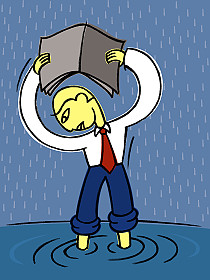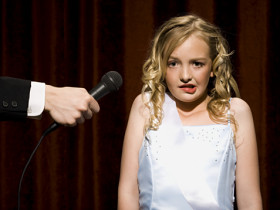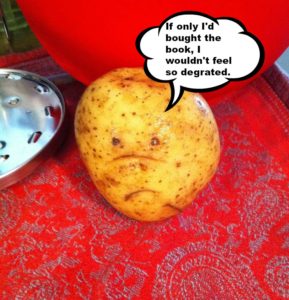The first time I read in public, (a Grub Street open mike event at the now-defunct Johnny D’s in Somerville, Massachusetts) I flopped. I failed. I sucked.
Years later (no more experienced) with my debut book launch looming, I was terrified. My mouth became dust each time I practiced, but a glass of water in hand, I went to work.
First, pre-publication months were spent attending bookstore events with a notebook (and money to buy the book of any author to whom I listened) in hand.
Many of the ‘rules’ below I learned from either the tortuous (and, worst of all, lifeless) readings I attended or the great ones. My first lessons in how-to-not-bore-people-to-death came from hearing authors who knew how to do it right.  Steve Almond is funny, edgy, and self-deprecating. Marianne Leone, entertaining, honest, and generous—and fantastic on her self-read audiobooks, stuns the audience. Tayari Jones reads so well aloud a rarity!) that I’d listen for hours. ) Learning by watching was invaluable. I picked up tips and I learned my limits. #Playtoyourstrength.
From those visits, from reading the terrific book Naked at the Podium, and from my strict sister, husband, and writer’s group (who so kindly listened to my first efforts) I came up with this list:
1. Shorten Your Reading:
Don’t fall in love with yourself. It’s the rare author who can read from their book for more than 8-10 minutes (and even that may be too long) without engendering a tune-out from the audience. If you think you’re the exception to that rule — that you are the gifted one—I challenge you to videotape yourself reading. Then judge.
Sharp, focused, and specific is better than droning, descriptive and general. What’s that I hear? You think your presentation is brilliant? Each word a gift to the audience’s ears?
To you. And perhaps your mother.
With each book, I spend hours searching for the right passage to read, seeking a scene I can excerpt to have a beginning, middle, and end. I write “excerpt” because that’s what I’ve learned to do. Hearing a passage aloud is different from reading. Audiences tune out long descriptions (and begin planning their dinner menus as you drone—again, go forth and visit other author’s readings.) I hone and then hone more, (telling the audience that this is a cut-to-the-bone version.)
Make sure the audience is oriented when you read. I’ve heard many presentations where I am lost. I’ve come to appreciate beginning at the beginning.
Slicing away the frills, I can come up with a 5 – 7 minute (or less) read that has a narrative arc. (I did once have an audience member ask me if what I did was ‘legal’ to present shortened material– a question that tickles me to this day.)
These days, now presenting book 4, I often cut the reading portion down to three paragraphs—and sometimes just one—the opening.
2. Practice, practice, practice:
I can’t stress enough the difference this will make. Read aloud endlessly, until you are on automatic and spend your energy on delivery.
Practice in front of someone honest.
And then practice by yourself. Again. And again.
3. Start with a compelling presentation:
I spend well over half of the presentation talking about what I consider to be the more revealing or compelling backstories of my book. You can’t convince your audience your work is worth reading by saying,”My book is so funny! So heart-warming! So literary!” Be funny, heart-warming, and/or literary.
(And for goodness’ sake, never read aloud your reviews or the blurbs you’ve received.)
4. It’s your job to do at least one of these five:
Entertain.
Enlighten.
Excite.
Engage.
If you are incapable of any of the above, pick a relevant-to-your-book topic and do some research, so that you can:
Educate.
5. Be humble. No matter who the heck you are:
I listened to a bestselling author who, after his reading, shared stories of his fame. He then warned the audience that he had a date with his wife, so please don’t try to talk to him!
Um….maybe pick a night to present when you aren’t having dinner withing moments after?
I know there was a better way to present that information.
6. Pick out your reading passage well in advance:
Few writers entertain, enlighten, educate, or excite while stumbling their way through unfamiliar territory. Leafing through your book, looking baffled, letting the audience know you are seeking something to read, only says, “I didn’t care enough to prepare.”
And I’ve been to readings where folks did that. They’d roll their eyes as though someone forced them into the room at gunpoint, and say, “I guess I should pick something to read.”
7. Smile, for goodness sake!
If smiling is against your belief system, please find some other way to let the audience know you are happy to see them. Bring cookies. Wine. The readers are gifting you with their presence, not vice-versa.
Don’t forget to look up. When I’m presenting, IÂ look for one person to be my ‘safe’ person; there’s usually one kind face out there. Talk to them.
8. Don’t whine:
Don’t say any of the following:
“I hate readings!” (Then don’t subject us to it.
“This is the worst part of writing.” (Then stay home.)
“I’m exhausted!” (Then go to sleep.)
9. Be concise:
Don’t ramble. Make your point. Do not restate your points. (See how I just said thrice what I should have said once?)
Double (triple?) your brevity when sharing the stage. Writers who step on the toes of other writer’s time — on panels, in two-person bookstore readings, at events — embarrass themselves and enrage the other writers.
10. No drinking to excess:
In my case, this means no drinking at all. Know your capacity. (I have none.) I’ve cringed — along with the rest of the audience — when subjected to a drunk author’s slurred words
11. Dress decently!
You don’t have to sweep in wearing a tuxedo or haute couture, but you should:
wear neat ironed clothes
- not smell
- be more dressed up than your audience
- comb your hair
- wear neat ironed clothes
- not smell
- be at least as well-dressed as your audience (though more is better.)
- respect your audience.
- Intellectual and cool doesn’t mean rumpled. Few can get away with it.
12. Coping with bad events:
When you have a disappointing, blah, or atrocious reading (we all have off nights) shrug it off. Don’t turn to the audience for sympathy—it only makes it worse. (You can try joking about it, but chances are that will make it worse.)
I remember (ugh) my worst reading — I was hot, sweaty, and nervous. I was surrounded by two authors far more experienced, fascinating, pretty, thin, funny, and entertaining than I could ever be.
Plus they had prettier jewelry and were better dressed.
And I hadn’t prepared properly for the audience.
It was like an awful date. I just wanted to go home.
After, I cringed. I had that overflowing glass of wine. I learned that I needed to become a better speaker. (And I’m certain those two thin funny writers are laughing at me to this day.
Conversely, when attending a reading of a fellow author who is off her game, only give advice or critique if invited. (And even then, judge the request. Rule of smart-thumb: when asked at a party “does this make me look fat,” the answer is always “no!”)
There’s a special place in hell for unsolicited advice. I still smart from the fellow writer who, in line at a bookstore book signing) that for personal reasons had been particularly nerve-wracking) in the guise of friendly help, leaned over the table to say (as 25 people stood behind him), “You sounded so nervous! I thought you’d do better. You know, you should be less nervous when you speak! Were you okay?”
Not anymore, I wasn’t.
** Extras!
a. Have someone take pictures. You’ll be glad you have them.
b. When attending other writer’s readings, it’s always noticed whether you do or don’t buy books. And you can imagine which action invokes which feeling. My personal pledge? Call it karma, call it good manners —either way, reach into your wallet.
And when you tell yourself you ‘can’t afford it,’ please remain truthful and ask yourself these questions:
How many Starbucks or other over-priced coffees did I buy this month?
How much wine or beer or other alcohol did I consume, and how much did it cost?
Is my reputation with other authors worth as much as two glasses of wine?






